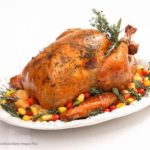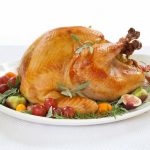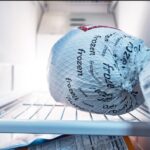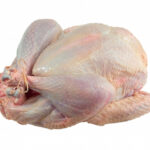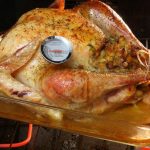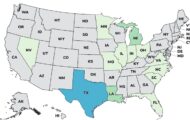Get Thanksgiving turkey safety tips from the USDA, including how to thaw and cook the bird, for a safe holiday. The biggest meal of the year comes with special food safety issues, especially regarding the turkey. The first step is thawing the turkey, if you purchased a frozen bird. Never ever thaw turkey or any meats at room temperature. Turkey can be thawed in the fridge; allow 24 hours for every four pounds of turkey. That means if you bought a 16 pound turkey, you need to allow four full days for thawing. After the turkey is thawed using this method, it can be kept, uncooked, in the fridge for two days. You can also thaw the turkey in cold water. Allow 30 minutes of thawing per pound, and submerge the turkey in its original wrapping. Change the water eery 30 minutes until the … [Read more...]
Alternate Turkey Preparation Methods From the USDA
The USDA is offering tips on alternate turkey preparation methods for the Thanksgiving holiday. If you choose to prepare turkey other than roasting it in the oven, read carefully to avoid food poisoning or injuries. Whatever method you use, make sure that the turkey reaches 165°F, a temperature that must be read with a reliable and accurate thermometer. First, do not cook the turkey in brown paper bags from the grocery store. That product can emit toxic fumes and may cause a fire. The ink, glue and recycled materials in brown paper bags are especially toxic. Electric Roaster Oven If you choose to use an electric roaster oven, the cooking times and temperatures should be the same as in a conventional oven. But always read the user manual for the manufacturer's instructions. The … [Read more...]
Safely Thaw Your Thanksgiving Turkey With USDA Tips
Learn yow to safely thaw your Thanksgiving turkey with these timely tips from the USDA. If you bought a frozen turkey, now is the time to start thawing it so it's ready to cook on the big day. It's critical that you learn this fact: never ever thaw your turkey, or any frozen food, at room temperature unless the package specifically states that it's safe to do so. If you thaw meat products, especially, at room temperature, the product will sit at the danger zone of 40°F to 140°F for too long. And bacterial counts double in amount every hour in that temperature range. Since bacteria can produce toxins as they grow that are not destroyed by heat, cooking a contaminated turkey may not make it safe to eat. And you could get sick. The USDA says that one of the most common question … [Read more...]
Should You Buy a Fresh or Frozen Turkey For Thanksgiving?
Should you buy a fresh or frozen turkey for Thanksgiving? That holiday is next week. The USDA has some tips to make sure you have a safe and healthy dinner. Turkeys are sold both fresh and frozen. You can often order the type and size of turkey that you want ahead of time, but if you haven't done this, you need to make some decisions. Food safety is critical at all times, of course, but holiday dinners are special. You may have elderly guests at your dinner, or a pregnant woman, or small children, or someone with a chronic illness or compromised immune system. In that case, you must be very careful to make sure that the food you serve is completely safe to eat. And turkey storage and preparation play a large part in food safety. Here's what the USDA says about which type of … [Read more...]
Serve Safe Turkey and Stuffing This Holiday Season
During the holidays, one of the most often prepared recipes is turkey and stuffing. This tradition is delicious, but fraught with potential problems, especially for beginning cooks. Clemson University offers tips on how to prepare this type of recipe and how to serve safe turkey and stuffing. Most food safety experts recommend that you do not stuff your turkey. If the stuffing isn't completely cooked to 165°F it can contain live pathogenic bacteria, since the turkey acts as an insulator and it's difficult to heat the stuffing in the very center. This may disappoint people, since stuffing cooked inside the bird is moist and well flavored from the turkey itself. But you can replicate that taste and texture by simply drizzling turkey stock over the dressing in a casserole, and … [Read more...]
Unsafe Ways to Prepare Your Thanksgiving Turkey
Did you know that there are unsafe ways to prepare your Thanksgiving turkey? While we have covered prepping and cooking the turkey safely, including proper thawing and roasting to the correct temperature, there are other physical parts to the preparation to think about. First of all, the method you use for cooking your turkey is important. You can roast the turkey, grill it, or deep fry it. Roasting is the most common method, and it is the safest, both in terms of food safety and physical safety. Grilling is the next safest, as long as you keep an eye on the bird, understand the risks of grilling such as fire and burns, and use a food thermometer. Just never use a grill in a covered area, not even a breezeway or the garbage because you risk carbon monoxide poisoning. But deep … [Read more...]
Learn How to Safely Prepare a Turkey For Thanksgiving
Thanksgiving is Thursday! Most people will be having turkey and stuffing. Read on to learn how to safely prepare a turkey for Thanksgiving dinner. While this task isn't difficult, there are some rules you should follow to avoid food poisoning. The Centers for Disease Control and Prevention (CDC) has tips. First, plan ahead. If you buy a frozen turkey it needs time to thaw - in the refrigerator. Never thaw a turkey on the counter or you are inviting trouble. Allow 24 hours of thawing for every four to five pounds of bird. If you have a big turkey, it may be too late at this point. In that case, you still have options. You can thaw the turkey in cold water, but you have to keep an eye on it. Make sure the turkey is in a leakproof bag before you put it in the sink. Add cold water … [Read more...]
Planning to Fry Your Holiday Turkey? Safety First
Are you planning to fry your holiday turkey? If you are, there are some things you need to know. There have been many accidents and injuries associated with this type of cooking over the years. Learn how to fry a turkey safely with these tips. The Consumer Product Safety Commission (CPSC) says that cooking fires are the number one cause of residential fires. And turkey fryers pose particular risks. Since 1998, there have been reports of 222 fire or scald/burn incidents involving turkey fryers. These incidents resulted in 83 injuries and $9.7 million in property loss. To protect yourself, only fry a turkey outside and well away from your home. Prince William County has more tips on turkey frying. While Thanksgiving is the peak day for home fires caused by cooking, Christmas and … [Read more...]
CDC Study Reveals Salmonella Serotypes Linked to Thanksgiving Foods
A new CDC study has revealed the Salmonella serotypes most commonly linked to Thanksgiving foods such as turkey. The study used routine surveillance for the years 1998 to 2018, and a case-crossover design. In 2017, there were about 45,000,000 turkeys produced for Thanksgiving. About 88% of consumers in the United States report that they eat turkey during the Thanksgiving meal. There are about 1 million cases of Salmonella reported in the United States every year. These illnesses cause 20,000 hospitalizations and 400 deaths annually. Since a small percentage of people infected with this pathogen actually seek medical help every year, the number is likely much higher. Salmonella Hadar and Saint Paul are the serotypes that are most commonly associated with turkey. The serotypes … [Read more...]
Prepare Your Holiday Turkey Safely with Tips From the CDC
It's almost Thanksgiving! Prepare your holiday turkey safely with tips from the Centers for Disease Control and Prevention (CDC). Since turkey can be contaminated with Salmonella bacteria, it must be handled carefully. First of all, store the turkey properly. It should be stored in the freezer until you are ready to thaw it. Do not store a turkey in a car trunk, in snow, or on the back porch. At this point it's too late to properly thaw a large frozen turkey in the fridge, but you can cook it from the frozen state. It takes 24 hours of thawing in the refrigerator for each four to five pounds of turkey. Never ever thaw a turkey or any meat on the counter. The meat will remain in the danger zone of 40°F to 140°F too long, and bacteria will multiply. At room temperature, bacterial … [Read more...]
